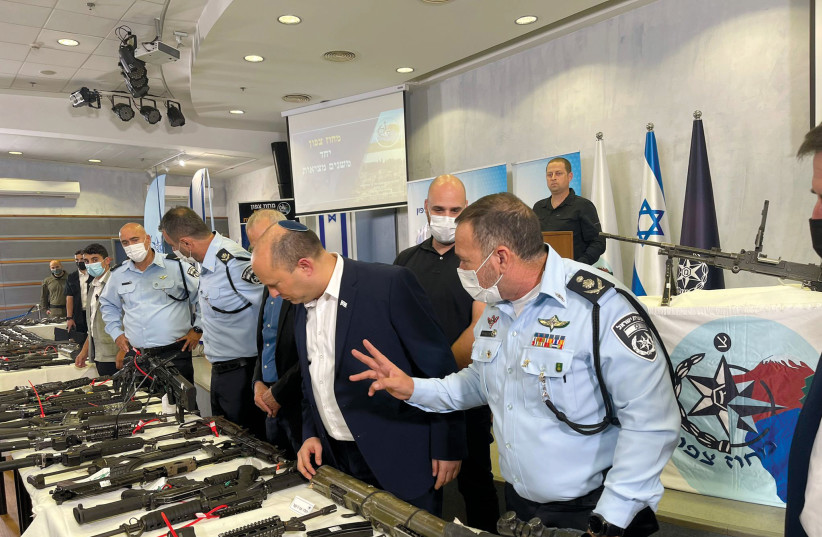Khaled Khaldi, a 50-year-old man from the Bedouin town of Khawalad near Haifa, was gunned down on Monday, most likely the result of an ongoing criminal dispute, the police said.
According to the Abraham Initiatives organization, which tracks murder statistics in the Arab community, Khaldi’s murder marked the 91st Israeli Arab violent death in 2023, compared to 34 at this time last year.
Khaldi was murdered on the same day that Prime Minister Benjamin Netanyahu convened a meeting with a group of Arab MKs and Arab local council representatives to discuss ways to combat the escalating violence in the Arab community.
There have been more murders in the Arab sector in the first five months of 2023 than there were in all of 2016 (64), 2017 (75), and 2018 (74). The number of people killed in the Arab community this year is on the trajectory to reach more than 200, far outstripping the worst year of violence when 126 Israeli-Arabs were killed in 2021.
Those numbers are astounding, and the representatives of the Israeli Arab sector are crying out for the government and the police to do something to help them. As the violence spiraled out of control in 2021, the Bennett-Lapid government budgeted some NIS 2.5 billion for the task and drew up a holistic approach to tackle the issue.

The plan – called Safe Track, under the responsibility of the then deputy public security minister Yoav Segalovitz – included steps aimed at dismantling organized crime, hitting the sources of funds for organized crime, cracking down on arms smuggling, strengthening the governance in the Arab sector, and building trust and increasing cooperation with the Arab local authorities.
It is a long-term plan that would take time to implement, yet by the end of 2022, the murder rates in the Arab sector had dropped by some 13%.
“Mr. Minister, nothing can be done. They murder each other. It’s their nature. It’s the mentality of the Arabs.”
Kobi Shabtai to Itamar Ben-Gvir
Israel's government does not prioritize tackling Arab sector crime
This trend was halted in its tracks in January. According to a study by Ephraim Lavie, Mohammed Wattad, and Meir Elran of the Institute for National Security Studies (INSS), part of the problem is that the current government is not prioritizing the problem.
The fact that Monday’s meeting with Netanyahu took place only some five months after the government’s formation points to the INSS conclusion.
The lack of trust in the government of the Arab MKs is understandable. Past statements by National Security Minister Itamar Ben-Gvir and Finance Minister Bezalel Smotrich make it clear that their priorities are the Jewish population of Israel.
In addition, the distrust deepened when a tape of Police Commissioner Kobi Shabtai emerged of him telling Ben-Gvir, “Mr. Minister, nothing can be done. They murder each other. It’s their nature. It’s the mentality of the Arabs.”
Despite their apparently well-founded distrust, the MKs from Hadash-Ta’al did meet with Netanyahu, and made it clear that they want the issue to be handled by Netanyahu directly, and not by Ben-Gvir, who earlier in the day, announced that he would appoint a special commissioner to handle crime in the Arab sector.
“In the view of many and rightly so, the fact that our lives are entrusted to that minister is evidence that the subject [of crime in the Arab community] has been dropped from the government’s scale of priorities, and that has to be changed,” the MKs wrote in the preamble to a 12-point proposal they presented to fight the crime scourge.
Ra’am chairman MK Mansour Abbas announced his support for the plan minutes later at a press conference ahead of his party’s weekly meeting, but he later said that the party had decided not to join the meeting with Netanyahu, with fellow Ra’am MK Waleed Taha tweeting, “We will not take part in a false show by Netanyahu.”
At the end of the meeting, Netanyahu agreed to the establishment of a ministerial committee, which he would chair, to fight the growing epidemic of violence and crime in Arab society.
That’s a positive development, but action now needs to take the place of words. As each day goes by, more Arab citizens of Israel are being killed, and the vast majority of law-abiding, peace-loving members of Israel’s Arab society are living in fear.
It’s not an Arab problem, it’s a national one. Both the government – and the police – need to internalize that, and do something about it now.
